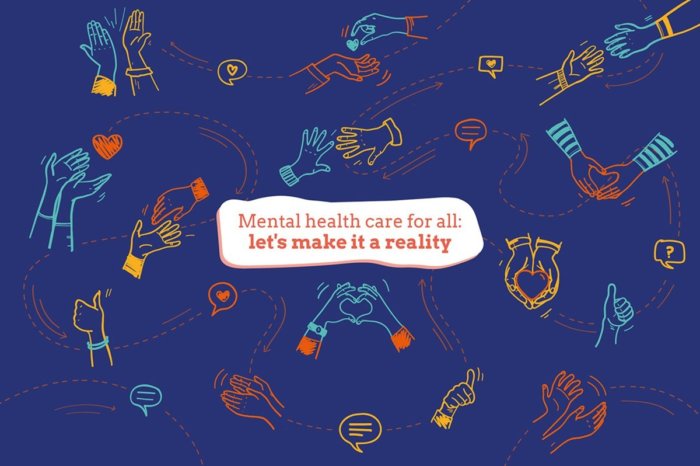Mental health day: let’s bridge the care gap.

As we celebrate World Mental Health Day this Sunday, October 10, the WHO Foundation continues to plead for systemic, structural, and cross-cutting mental health reforms from public health stakeholders, as well as increasing private sector support. Mental health care for all: let’s make it a reality!
In 1954, Dr George Brock Chisholm, the first Director-General of the World Health Organization, famously stated that “without mental health there can be no true physical health.”
Mental health is fundamental to our wellbeing and how we navigate through personal experiences in everyday life. It shapes the way we think, feel and behave. Perhaps more than anything else, mental health is vital to our individual ability to participate and contribute to society. Poor mental health contributes to poor physical health, poverty, and premature death.
Today, we are facing the greatest health challenge known to the human race in a century. COVID-19 has demonstrated the detrimental impact that a virus can have on global economies, societies, and our collective achievement of the Sustainable Development Goals (SDGs). The pandemic has also revealed that a virus can affect not only our physical health but also our ability to cope with the psychological impacts in its wake.
Alongside the unprecedented physical impact of COVID-19, a “mirror pandemic” has emerged with many countries reporting an escalation of mental health cases resulting from isolation, income reduction, fear of infection, and bereavement.
Mental health problems also convert into global mental health costs of USD$ 2.5 trillion every year. However, mental health services remain underfunded, with countries allocating on average just 2% of their health budgets to it, despite direct evidence of the economic benefits of investing in mental health. Furthermore, mental health policies and legislation remain inadequate in many countries around the world, which unfortunately perpetuates stigma, discrimination, and gross human rights violations.
In low and middle-income countries, it is estimated that more than 75% of people with mental health conditions receive no treatment for their condition. It is the so-called “mental health treatment gap”.
“There is no health without mental health. The two go hand-in-hand, which is why it is imperative to include these often ‘invisible’ issues in all global public health efforts”.
– Thomas Zeltner, Founder and Chairman of the WHO Foundation
Addressing mental health requires comprehensive approaches, which engage stakeholders across generations and geographies. The solutions need to be rooted across sectors and disciplines. The WHO Foundation was created with this spirit in mind. This transversal approach to global public health supports mental health, alongside non-communicable diseases, emergency preparedness, outbreak response, and health system strengthening.
The WHO Foundation is committed to creating a world where mental health is valued and protected across all global health issues, especially among young people. The WHO Foundation leverages the global reach of WHO and combines it with its lean and agile structure to engage donors in flexible and bespoke initiatives that allow them to bring their unique insights, objectives, and perspectives on building a healthy future for generations to come.
One of our key initiatives created in this context, The Future is Unwritten Healing Arts Initiative, is a rapid response fundraising platform and cultural call-to-action to support a global COVID-19 response through the arts; specifically to address the growing mental health crisis.
Launched in November 2020 as part of the World Health Organization’s (WHO) Solidarity Series of Events, the initiative dovetailed the WHO’s Together at Home concert, curated by Lady Gaga and featuring The Rolling Stones, Chris Martin, and Paul McCartney, among others, which raised over $180 million for emergency COVID-19 relief.
In collaboration with Christie’s auction house and a range of other partners including Tate galleries, Italy’s Castello di Rivoli Museum of Contemporary Art, and The Art Newspaper, the Healing Arts Initiative is leveraging the arts to raise awareness and funds through a series of auctions to address the mental health impact of COVID-19. These auctions have included works donated by Yoshitomo Nara, Antony Gormley, Martin Creed, Miquel Barcelo, and more artists. Funds raised will go towards WHO’s work on mental health, including the applied use of the arts.
Additionally, private bank Lombard Odier published a donor brief in partnership with the WHO Foundation for individuals and private foundations wishing to make a meaningful contribution to the mental health field. The Donor Brief on Mental Health is intended to be a useful resource for any philanthropist wanting to help individuals suffering from mental health problems.
In parallel, WHO’s Mental Health Atlas is released today and provides an overview of mental health resources available around the world. Data provided by 171 countries on mental health policies, legislation, financing, human resources, and the availability and use of mental health services, is compiled to show progress (and lack of progress) towards meeting the mental health targets set by the global health community. More on World Mental Health Day.
In celebration of Mental Health Day 2021, let’s all play a part in supporting mental health care for all: let’s make it a reality!

